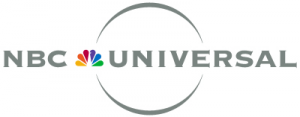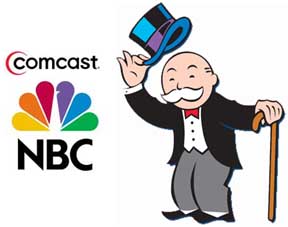![]() Comcast Corporation has completed its offer for NBC-Universal and they accepted in an early morning press conference unveiling a deal that had been privately rumored for months. Comcast will assume 51% control of NBC-Universal, with NBC-owner GE controlling the remaining 49% stake.
Comcast Corporation has completed its offer for NBC-Universal and they accepted in an early morning press conference unveiling a deal that had been privately rumored for months. Comcast will assume 51% control of NBC-Universal, with NBC-owner GE controlling the remaining 49% stake.
The combined entity, to be known as Comcast Entertainment Group, will bring Comcast-owned media into the home of every American, even those not served by Comcast Cable.
Although company officials said little would change immediately, Comcast has not ruled out dropping the legacy ‘NBC’ brand down the road. Broadcasting & Cable noted the company may be hinting at its intentions through its domain name registrations. The trade publication reported Comcast’s registrar locked ComcastNBCU.com and NBCUComcast.com in mid-October, but returned and registered ComcastEntertainment.com ten days later.
Brian Roberts, CEO of Comcast Corporation, joked that NBC’s fourth place position among the major American broadcast networks might “get in the way” of recognizing NBC-Universal’s cable networks, which he characterized as “fantastic.” Perhaps a change of NBC, which stands for the National Broadcasting Company, to Comcast Entertainment Network might change that perception?
Changes like that, and the implication of renaming a major American network after what most Americans recognize as a cable company has brought significant unease among some examining the scope of the transaction.
Comcast Entertainment Group will control a major American broadcast network, Telemundo – a major American Spanish-language broadcast network, Comcast Cable, the nation’s largest cable system operator, several cable networks, 27 GE-owned television stations in major American cities, a large number of regional sports networks, and more. It also manages broadband service for nearly 16 million Comcast customers.
Stifel Nicolaus telcom analysts Rebecca Arbogast and David Kaut warned potential investors this deal has a lengthy and difficult regulatory review waiting for it in Washington, DC: “We would expect scrutiny of the transaction’s impact on program access, program carriage and retransmission consent, as well as local TV advertising, broadcast-network affiliate arrangements, program bundling, broadband/Internet video and network neutrality and possibly other issues, including cable pricing…broadband service, labor concerns, spectrum and privacy.”
The dealmakers recognized the challenges and started throwing voluntary concessions to concerned groups. Unimpressed Comcast shareholders got a bone thrown their way — a surprise 40% increase in their dividend, in hopes that will quiet shareholder unease.
Comcast also sent letters to regulatory officials promising NBC will remain a free, over the air broadcast network and not be converted into a cable-only channel.
The cable operator will also add additional independently-owned cable networks to its lineup to quiet concerns it might favor its own cable networks. Of course, whether customers want to watch and pay for those channels is another matter.
Finally, Spanish language services from Telemundo and other channels will receive enhanced free on-demand cable viewing options in cities where Telemundo is seen over-the-air.
For broadband users, the deal means Comcast gets a seat at the table of online video provider Hulu. NBC-Universal was a major proponent of the online video service which gives broadband users free access to broadcast and cable programming.
That deeply concerns Andrew Schwartzman, president and CEO of Media Access Project. He’s concerned about the enormous market power Comcast Entertainment will have.
 “I am especially concerned about the effects the merger would have on evolving technologies for delivering video over the Internet….I also expect a great deal of opposition from the private sector, since the merger has anti-competitive implications for local TV stations, independent cable programmers, advertisers, internet video entrepreneurs and many other businesses,” he told The Hill. Both Media Access Project and Free Press have called on regulators to reject the deal.
“I am especially concerned about the effects the merger would have on evolving technologies for delivering video over the Internet….I also expect a great deal of opposition from the private sector, since the merger has anti-competitive implications for local TV stations, independent cable programmers, advertisers, internet video entrepreneurs and many other businesses,” he told The Hill. Both Media Access Project and Free Press have called on regulators to reject the deal.
“The American public doesn’t want a media behemoth controlling the programming they watch and how they can access it,” said Josh Silver , executive director of Free Press. “If Washington allows this deal to go through, Comcast will have unprecedented control of marquee content and three major distribution platforms: Internet, broadcast and cable. We’ve never seen this kind of consolidated control.”
[flv width=”596″ height=”356″]http://www.phillipdampier.com/video/NBC Today Show Announces Comcast Deal 12-03-09.flv[/flv]
This morning’s Today show on NBC briefly reviewed the deal and what it means for consumers (1 minute)
[flv]http://www.phillipdampier.com/video/CNBC Parsing the Comcast NBC Deal Craig Moffett 12-03-09.flv[/flv]
Sanford Bernstein’s Craig Moffett talks with CNBC about why many telecom sector analysts are underwhelmed by the Comcast-NBC deal (3 minutes)
<
p style=”text-align: center;”>
GE CEO Jeffrey Immelt and Comcast CEO Craig Roberts join CNBC’s David Faber for an in-depth discussion about the transaction and the changing media business. (28 minutes)
Learn more about NBC’s broadcast operations impacted by this deal below.


 Subscribe
Subscribe




